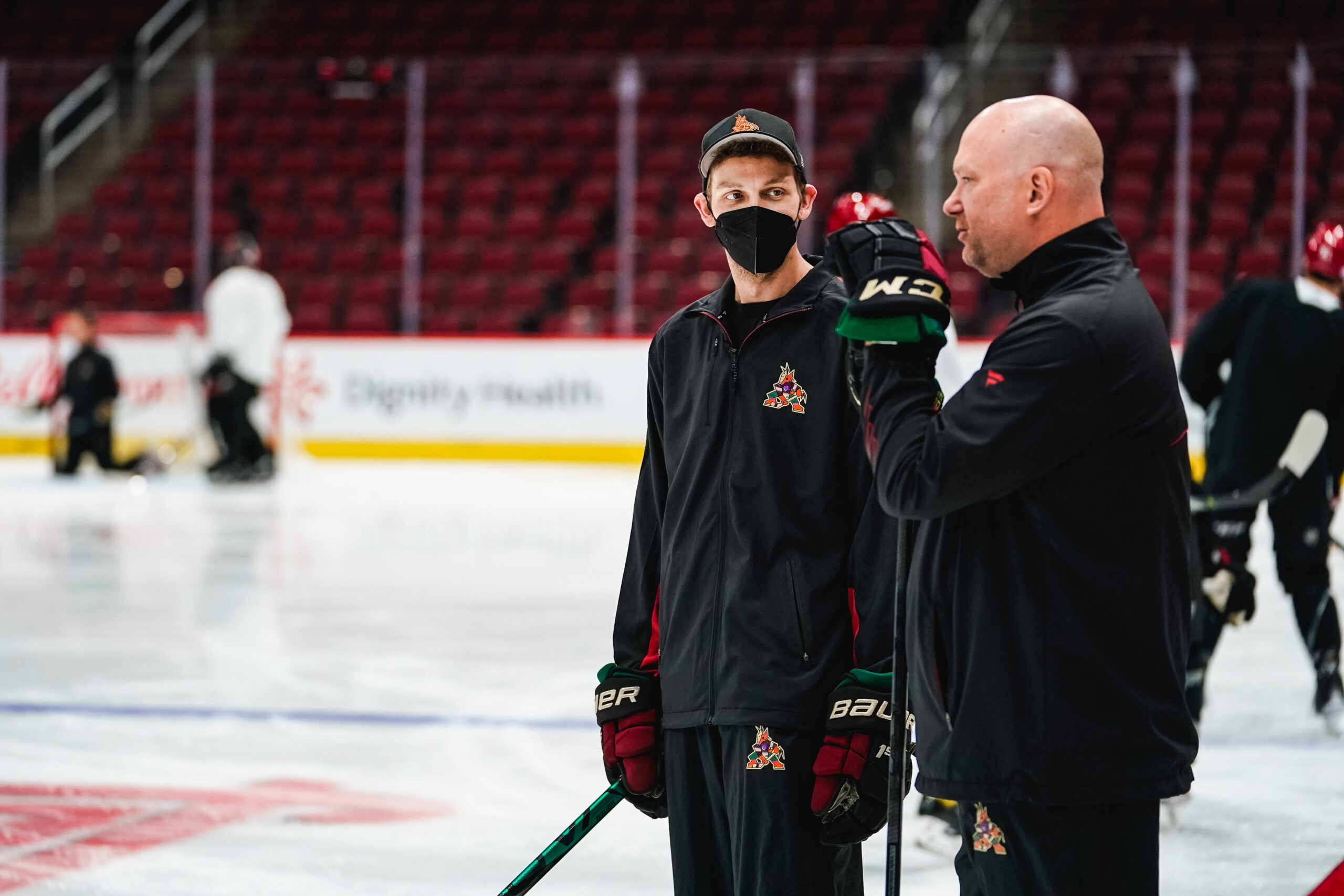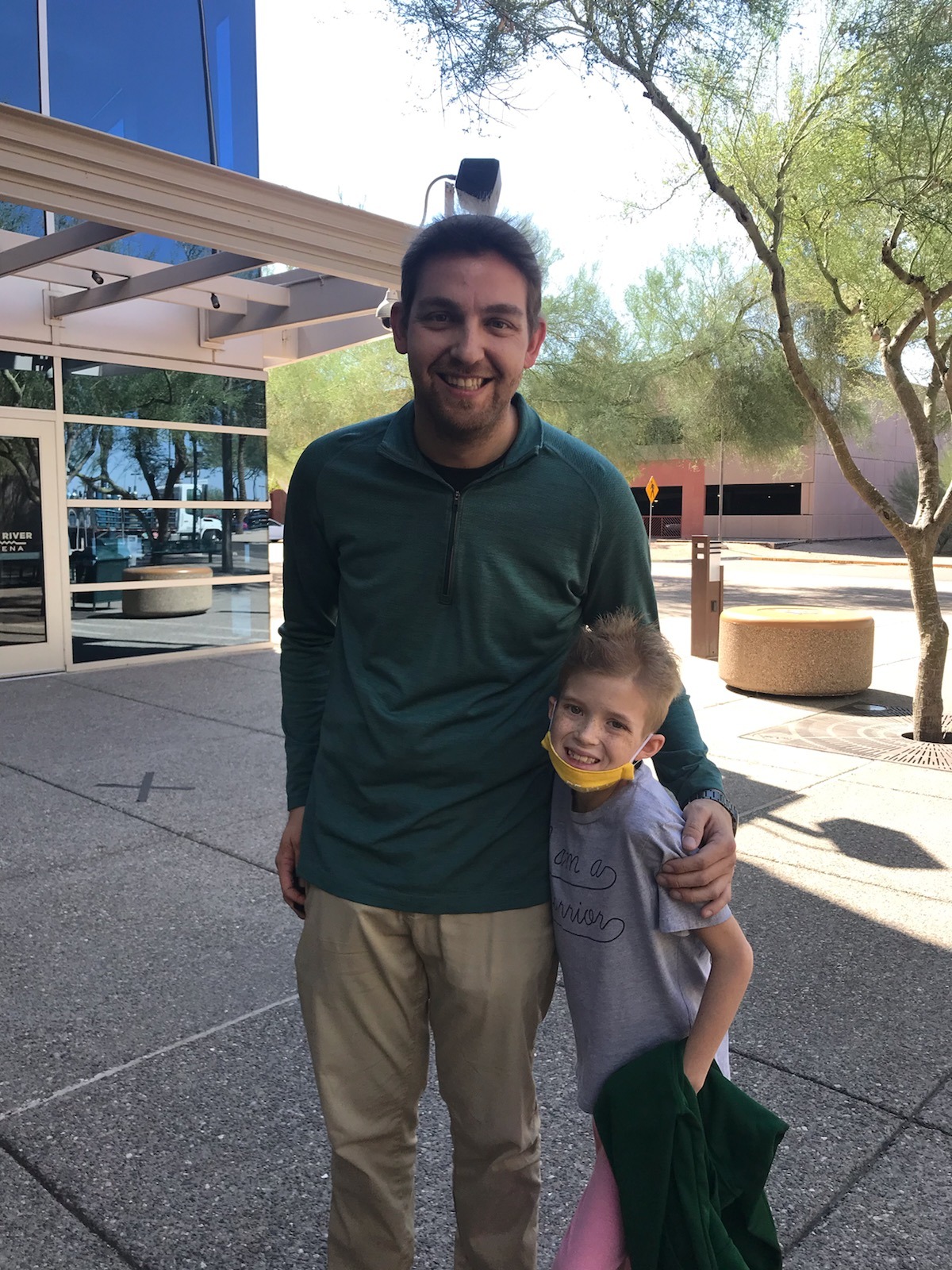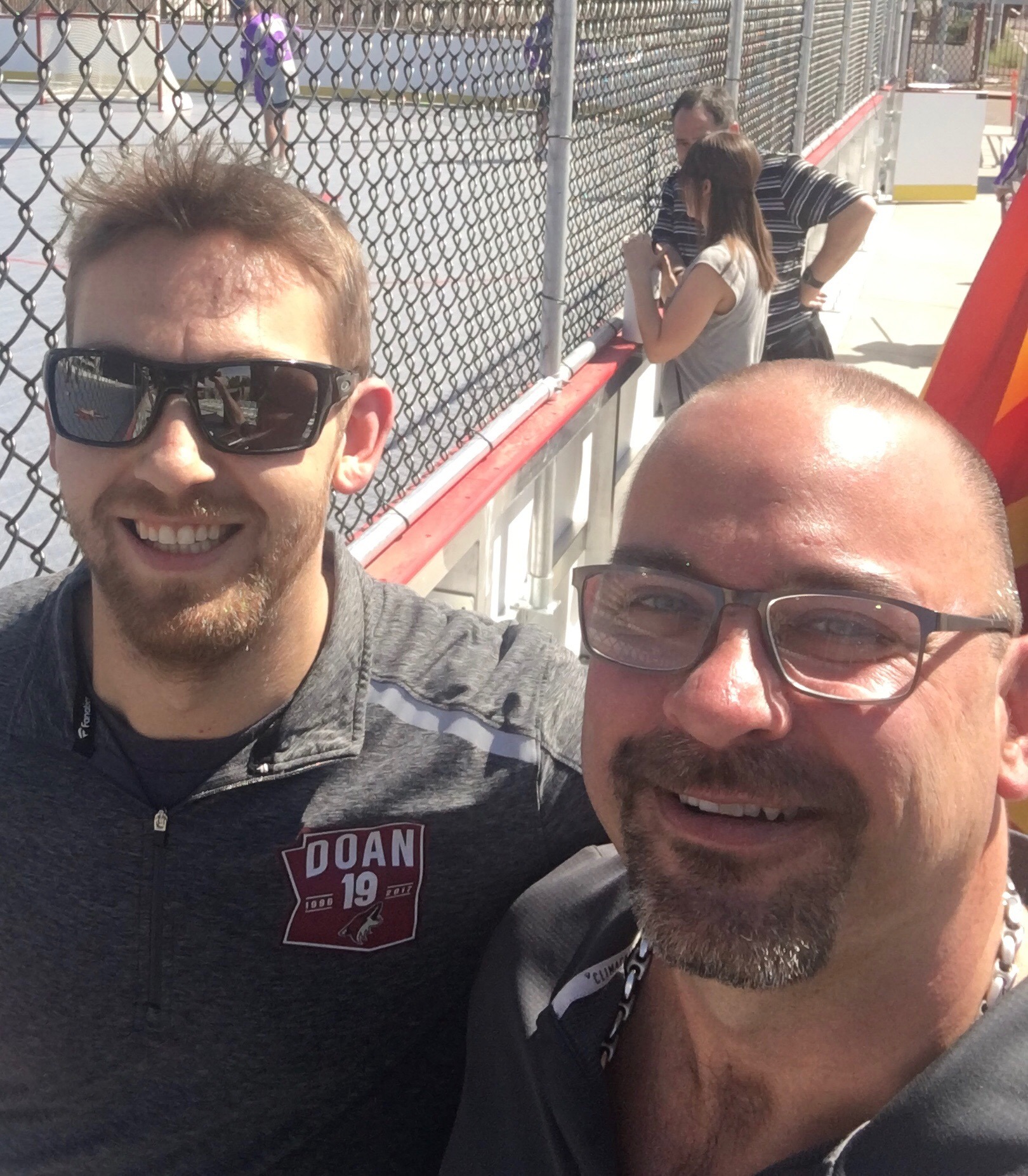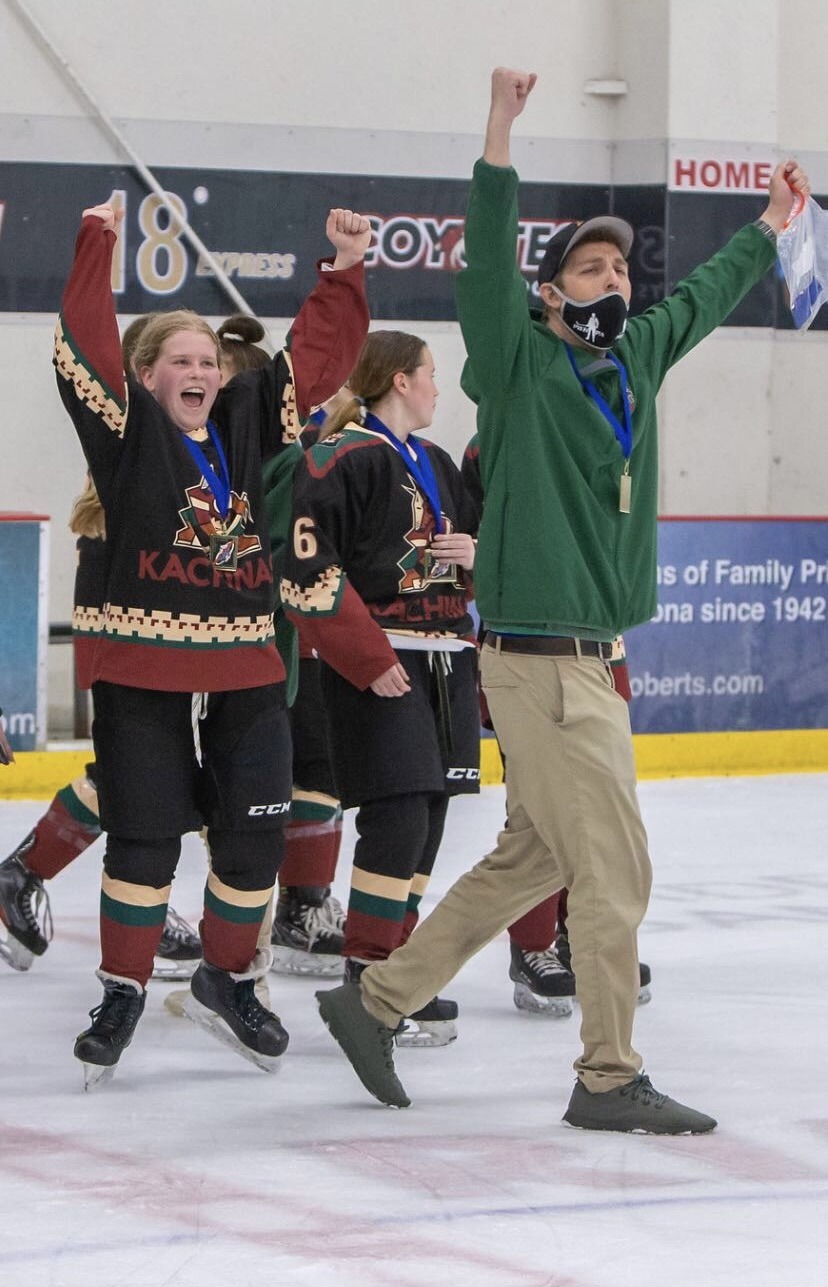© 2025 ALLCITY Network Inc.
All rights reserved.

When Carly and Jeremy Accardo learned that Matt Shott had cancer, the news was like a gut punch to a family that needs no more challenges. Their daughter, Leighton Accardo, touched the Valley and the entire hockey world during her courageous, 18-month battle with cancer. Shott is a close friend of the family, he was one of Leighton’s coaches for the Arizona Kachinas summer programs, and he was her biggest publicist.
“I’m so grateful to Matt because he provided Leighton with so many wonderful experiences and memories,” Carly Accardo said. “He was the reason that she was so well known in the Valley. He brought her in as the ambassador and he was responsible for 90 percent of that day at Hockey Fights Cancer two years ago.
“He has no idea how amazing that day was for her, and how much it meant to our family. For him to give her that superstar status, to give her that platform for everyone to know her and see her and to learn from her battle — I will forever be grateful to him.”
Shott never expected to share the limelight with Leighton. Those who know him best know that he avoids the spotlight, but that’s exactly where he will be when the Coyotes face the Red Wings on Hockey Fights Cancer Night at Gila River Arena at 6 p.m. on Saturday.
The Coyotes will honor their senior director of hockey development with videos in a pre-game ceremony, and there will be a few more surprises waiting for Shott when he takes the ice. One of those already occurred when he lived out a lifelong dream by serving as a Coyotes assistant coach at a team practice recently. He also participated in coaches meetings and video sessions for two days.
“I was in there when (GM) Bill (Armstrong) and the coaches were talking and they didn’t hold back on anything,” Shott, 34, said with wide eyes. “There were a couple times where I was like, ‘Do you guys want me to leave while you discuss this stuff?'”

Much of the credit for planning Shott’s special events goes to Lyndsey Fry, the Coyotes ambassador and director of external engagement, youth and women’s hockey. Fry works closely with Shott in the organization’s efforts to grow the game in Arizona.
“A couple months ago, I asked him, ‘How public do you want your cancer journey to be?’” Fry said. “I told him, ‘If you want it, I’m going to push hard for you to be the star of the show that night.’”
Shott decided that transparency was another way in which he could help others so he agreed, and he gave Fry a wish list of things he’d like to have for Hockey Fights Cancer Night. Fry even helped create a Shott shirsey whose sales have been brisk.
“I’ve never met someone more selfless in my entire life and I tell him often, it’s almost to a fault,” Fry said. “He gives all of his time, all of his energy, all of his emotion to hockey and he considers the hockey community his family.
“It’s one thing for me to beat that drum and tell him that, day after day, but for him to see it on Saturday, to just see the waves of people that want to come out and support him: I think that’s the best gift that we can give him for all of the hard work that he’s put in over the years.”

The latest challenge
Shott has battled health issues much of his life. When he was 17, he had a splenectomy after the organ became infected and enlarged to three times its normal size.
“I got scratched by a cat and they legitimately told me that Cat Scratch Fever was a possibility,” Shott said, chuckling. “I lost like 60 pounds and that’s when I started focusing more on coaching.
“I tried playing in one tournament after I got back during my senior year of high school, and I was just like, ‘I can’t do this.’ I’m not a terrible player, but I was not skilled enough to not have size to use to my benefit.”
Recently, Shott was diagnosed with pericarditis, an inflammation of the membrane enclosing the heart, which necessitated treatment. When he was 20, he was diagnosed with ulcerative colitis, and when he was 21, he was diagnosed with primary sclerosing cholangitis (PSC), a liver disease that stems from ulcerative colitis.
“They told me then that about 10 to 15 years down the line, it’ll affect you,” Shott said. “Technically, they nailed it because it’s 12 years from when this cancer diagnosis happened.”
Because of his past health issues, Shott has always gone for regular medical check-ups. In February, his gastroenterologist told him that they had found high-grade dysplasia in his colon that was precancerous. The options were to try a different form of treatment or remove his colon. Shott chose the latter, but he asked if the procedure could wait until May because the U14 Kachinas team he coached was playing well and he didn’t want to disrupt their season “with any negative vibes.”
In March, he had an MRI on his liver and that’s when they found the first lesion. The only people he told at the time were his family members, Fry, Coyotes general counsel Marina Carpenter, and his coaches. When the Kachinas season ended, he started sharing the news widely.
“They also found cancer in my liver,” said Shott, whose father, Chuck, died of lung cancer in 2015. “They took that out in May and they took the colon out in June. On the other side of the liver was where they found what I have, which is bile duct cancer. I asked if they could do an ablation but because of where it is they can’t. We have to do chemo(therapy) and just hope for the best.
“Fortunately, the chemo that I’m on, it’s not heavy duty. The worst of it is fatigue. I didn’t lose my hair and I really didn’t get nauseous. I do eight pills a day for two weeks and then do one infusion every three weeks.”
Shott has lost 22 pounds since this ordeal began, but he has discovered a silver lining in that fact as well.
“I don’t normally eat breakfast but when I go to Dutch Bros. now I get a blueberry muffin and sometimes something else,” he said, laughing. “I can go to Jet’s Pizza and order a full pizza and just chow. It’s awesome.”

Wide-ranging impact
Shott was working at Oceanside Ice Arena in Tempe when Sean Whyte arrived to run the Desert Youth Hockey Association in 2008. Shott coached some teams in the organization, the two ran learn-to-play programs together, they have been on the state governing board together and when Shott and Fry began running the Kachinas, they sought Whyte’s expertise on by-laws and policy.
When the NHL hired Whyte in 2017 as a regional director for the league’s department of social impact, growth initiatives and legislative affairs, Whyte asked Shott to accompany him to Las Vegas to run five, one-hour ball hockey clinics for the Golden Knights before they had a staff in place. Shott never hesitated.
“The epitome of hockey for everyone is Matt,” said Whyte, who is based in Arizona and played for the Roadrunners, Mustangs and Cobras. “He’s the person that grows hockey at the grassroots level. He’s the person that is a huge proponent of girls-only hockey from cradle to grave. He’s the guy helping with special needs programming. He’s at sled hockey, supporting that, LGBTQ-plus hockey, ball and street hockey, doing all the school programs and in-line hockey.
“When you think about ice hockey and getting kids out on the ice, that’s fantastic and important work. But no matter what style of hockey you’re talking about, he’s promoting it and growing it. His impact here in Arizona is immeasurable.”
At the core of Shott’s approach is his commitment, Whyte said.
“You can build a template for how to grow the game, but once you get them there, how are you going to get them to come back?” Whyte said. “Nobody cares how much you know until they know how much you care. Unless you have people like Matt Shott, you’re not going to succeed. What he does in the Valley and in Arizona for the sport of hockey is so genuine and so from his heart that you can’t duplicate it. It just has to come from within; it has to be innate. And with him it completely is.”

The road ahead
Shott is getting top-notch care through Mayo Clinic, thanks to the Coyotes. He even has a medical therapist to be sure he remains in a good mental state.
“There’s days when I feel bad because of how well I’m going through treatment,” he said. “I see these people in such worse conditions and I’m still drawing plays for practice that night. My therapist told me that it’s called survivor’s guilt.”
Despite the fatigue that comes with treatment, Shott has still taken recent trips with his Kachinas to Utah and Detroit. He isn’t altering his practice schedule and he still expects to be as heavily involved in the greater hockey community as he always has been.
“The doctors said, ‘As long as you feel good, keep doing what you’re doing,’” he said. “They think that has a lot to do with why I’m doing so well is because mentally, I’m able to just keep going.
“Hockey has always been my happy place and I want that to be an option for as many people as possible. That’s why I do this. That’s why I want the community to be bigger and it doesn’t have to be by playing on ice. It can be any form of hockey. If I can make hockey a happy place for more kids, that’s all I want.”
When he began researching his form of cancer, Shott learned early on not to pay heed to life expectancy data or overarching opinions. His case is unique, he is listening to his doctors, and their optimism is only fueling his natural approach.
“You beat cancer by living your life so I’m really focused on having a very positive mentality and working and living a normal life,” he said. “I’m living my life until there’s no life left to live.”
Follow Craig Morgan on Twitter
Comments
Share your thoughts
Join the conversation



